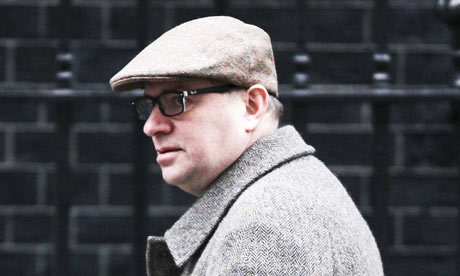 The Charlie Whelan problem is intensifying for Labour, with more revelations in the Mail on Sunday today taking on from our
cover story in this week’s magazine. Whelan’s behaviour may be no worse than that of Ed Balls and Gordon Brown – but he is more careless. Like McBride, he was actually caught: and
his tactics documented in a formal seven-page report. Not the sort of document you want surfacing during a campaign. So it’s little wonder why Whelan used Carter-Ruck to try and deter The Spectator from any further investigation in the bullying case:
it threatens to expose Gordon Brown’s entire modus operandi and the methods which he uses to control the party. And, for that matter, run the country.
The Charlie Whelan problem is intensifying for Labour, with more revelations in the Mail on Sunday today taking on from our
cover story in this week’s magazine. Whelan’s behaviour may be no worse than that of Ed Balls and Gordon Brown – but he is more careless. Like McBride, he was actually caught: and
his tactics documented in a formal seven-page report. Not the sort of document you want surfacing during a campaign. So it’s little wonder why Whelan used Carter-Ruck to try and deter The Spectator from any further investigation in the bullying case:
it threatens to expose Gordon Brown’s entire modus operandi and the methods which he uses to control the party. And, for that matter, run the country.
The Whelan-Balls-Brown alliance was lucky to be able to cut McBride adrift and pretend they were shocked at the smear tactics he was caught using. In fact, McBride was a civil servant groomed by Balls & Co for his job as a character assassin. Now, in Whelan, they have another praetorian caught out using bullying and intimidation.
“It’s all a pack of lies” Whelan tells the Mail on Sunday. “I have been completely vindicated.” Unite says the bullying allegations “are totally false and without any substance.” Yet in the newspaper report, we learn that Sarah Merrill (one of Whelan’s victims) was given a payout “estimated at nearly £100,000” to sign a compromise agreement. Why shell out so much money if she was telling lies? Might it have been because she wanted a full investigation into Whelan? Such an investigation threatened to blow the lid of a far more dangerous story: the way that Brown had – through Whelan – launched a personal takeover of Unite and make it into his personal power base.
Whelan does not speak for Unite: 31 percent of the union’s members are Tory according to a Populus poll last year. Whelan’s arrival in Unite represented a Brownite coup d’etat – as illustrated by the cheques sent off to Ed Balls’ re-election campaign and other such good causes. Much as this infuriates Lord Mandelson, Whelan just cannot shut up. He feels indomitable: he has transformed the Unite political office into his fiefdom. By using loopholes in England’s notorious libel laws, he had hoped to shut up the press too – and this tactic is far more effective than you might think. Whelan knows that by saying “it’s libelous,” as he did in the Independent last week, rather than “it’s bollocks,” sends a chill through the British media – and a chill which threatens freedom of speech.
I won’t bore CoffeeHousers with the details of these libel suits. But the no-win-no-fee deals, which the Brownites are now using as a tool of spin, are a major threat to freedom of speech in this country. Fighting even the most absurd of claims (like Whelan saying he is not a bully) can cost the publication thousands. It costs the complainant nothing if (like Whelan and Tom Watson) they avail themselves of these so-called ‘Conditional Free Agreements’ to pursue and target journalists. The CFAs were aptly described by David Hooper, a libel lawyer, a couple of years back. They are, he said, “a scandal that allow dubious claims to be encouraged by lawyers. They create a ‘ransom factor’ that forces the media to settle before trial.” To see politicians use CFAs adds a whole new level of level of menace to what is already a grave situation. It is a turbo-charged means of spin and intimidation. It is entirely in keeping with the character of the Brownite operation that their accolytes should use such tools (even Lord Sugar threatened to sue Quentin Letts for being called ‘stupid’).
Will the threat of a libel and Carter-Ruck protect Whelan this time around? I’m delighted to see the Mail on Sunday stand up to him. But more broadly, I would not under-estimate the chilling effect that these threats can have. There is a reason you don’t read too many articles about the funding of terrorist organizations in the UK press – we don’t have freedom of speech protections like the United States does. Nor do we, as a country, protect those freedoms very effectively.
But election campaigns have a habit of dragging skeletons out of closets – even for those in the public eye. Ed Balls is already distancing himself from Whelan, saying in a statement to The Spectator that he has never had “breakfast, lunch or dinner with Charlie Whelan this year”. What can he mean? Is he distancing himself from his old friend, fearing that Whelan may be about to explode in the same way that McBride did? And if that does happen, would it be possible for Brown and Balls to say they had no idea about the tactics Whelan is using? I have a feeling we have not heard the last of this yet.
P.S. I should add that I was disappointed to see Dan Hannan, whom I admire as a politician, use Carter-Ruck to pursue the New Statesman. Sure, they sought to smear him on their blog – but the Press Complaints Commission obliges the press to correct such errors. I agree with the Index on Censorship that libel should have no place in politics.
PPS: I have now contacted Dan Hannan, who says that he did go to the PPC, who rejected his complaint – and this, he says, left him no option but to seek recourse in the law. I should have had more faith in him: the PPC’s failings leave the industry vulnerable to libel.







Comments